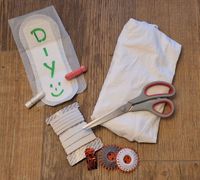Clever Management of Menstruation: Adapting with Improvised Means and in Emergency Situations
Can you imagine what a privilege it is for us to have easy and always available access to suitable materials or hygiene products to manage our menstrual flow? For us, tampons and sanitary pads are the most normal thing in the world and easy to obtain. But many girls worldwide don't have it that way; they face incredible limitations because they lack access to appropriate hygiene products (as we know them) to manage their flow. This forces them to stay home and be excluded from school and social life. In many schools in poorer regions, sanitary facilities are often in very poor condition, meaning cleanliness and especially privacy are dreams for these girls. In particular, in poorer areas, girls and young women lack the financial means to simply buy tampons or pads, and access to water for washing as needed is not available. (1)
Imagine facing the next month, maybe even the subsequent one, without access to menstrual hygiene products. What if a severe economic crisis forces the reduction or temporary halt in the production and distribution of menstrual hygiene products? Or there could be severe supply chain disruptions due to major natural disasters like earthquakes, floods, or pandemics, making critical products unavailable for some time.
You might think, "unimaginable, I couldn't survive that."
Of course, you can, you're in our University of Hope where giving up is never an option!
🌍 "I am Resilient Ranger, your supporter for sustainable and resilient solutions. Let's develop strategies and solutions together so that you can remain resilient in this crisis situation." Later, we might bring in our Comfort Keeper 🧘. He is the guardian of well-being and might have a few more ideas to help you better cope with this stress.
We understand that this is a very important and sensitive area, and we will approach it carefully and empathetically.
We have prepared some detailed approaches and solutions for you. Are you ready?"
Dealing with Your Menstruation
Point 1: Materials and Preparation
- Soft Fabrics: Cotton is particularly good for homemade pads as it is soft and breathable. Old T-shirts or bed sheets can be a good starting point.
- Needle and Thread: Make sure to have a few sewing needles of different sizes and strong thread.
- Washable Fabric Bags: Discarded cloth bags or leftover fabrics can be useful here.
- Plant-based Dyes: Dyeing and decorating can be both functional and a creative, therapeutic activity.
- Buckets or Containers: Even plastic bowls and hot water will do.
- Soap or Detergent: Choose a mild detergent.
- Discreet Storage Containers: Choose containers that are easy to transport and do not stand out
Step-by-Step Guide to Making and Using Menstrual Pads
1. Making the Pads:
- Cut soft fabrics (such as cotton) into rectangular pieces (approx. 20 cm x 10 cm).
- Fold the fabric pieces twice to reach a comfortable thickness.
- Sew the edges of the folded fabrics together to stabilize them. Add small ties on the sides to attach them to the waistband of your underwear.
- Dye the fabrics with plant-based dyes to make them more aesthetically pleasing and less noticeable.
Usage and Hygiene:
- Change the pads regularly (every 4-6 hours) and place the used pads in a bucket with water and soap to pre-wash them.
- Wash the pads thoroughly and hang them to dry. Use discreet places to minimize feelings of embarrassment.
- Use the discreet storage containers to keep clean pads within easy reach.
Communication and Support
1. Trusted Persons and Peer Support:
- Encourage other girls to support each other and talk about their experiences. Create a safe space where you can share your feelings and questions.
- Older girls or sometimes empathetic boys can act as trusted persons.
Education and Knowledge:
- Organize awareness talks where knowledge about menstruation and the female body is conveyed. Use simple and understandable explanations to reduce the stigma.
- Use stories and narratives from different cultures to show that menstruation is a natural and normal part of life.
Dealing with Mood Swings and Irritability (we all know this and you are by no means alone with these feelings)
1. Encourage open communication: Encourage other girls to talk openly about their feelings and moods. Create an atmosphere of understanding and acceptance. Use "I" messages to express your feelings, e.g., "I feel irritable today because ...".
Stress Management and Relaxation Techniques:
- Introduce relaxation methods such as breathing exercises, meditation, or light physical activities to reduce stress and tension.
- Create quiet zones where you can retreat and relax.
You will be amazed at how resilient, resourceful, and creative you can be, and I am firmly convinced that you can do it!
This contribution was written by Birgit Bortoluzzi, the creative founder of the “University of Hope” – an independent knowledge platform with a mission: to make resilience, education, and compassion visible and audible in a complex world.
(1) https://www.plan.de/magazin/artikel/gleichberechtigung/menstruation-weltweit.html

